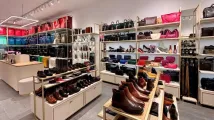Profil:
Wittchen SAWittchen plans to optimise logistics costs in H2 2024
Listed exclusive leather products manufacturer and retailer Wittchen wants to optimise logistics costs in the second half of 2024, the company representatives told a press conference. Wittchen plans to complete its investment in the logistics centre in Palmiry at turn of 2024 and 2025.
"‘In the second half of the year we want to be consistent in our actions. It's not as if we dreamed, but we don't live in a vacuum - the things that are happening all over the world, in Europe, the crises, the Chinese expansion, Chinese sales platforms are appearing, Chinese suppliers are doing everything to consume as much of the market cake as possible," said the company's CEO Jedrzej Wittchen.
"We want to pursue active sales at all costs, to sell as much as possible not only in Poland, but also on foreign markets. We are optimising costs, looking for system solutions (...). We try to cooperate with the best advisors and companies that support us in foreign sales," he added.
The company indicated in the presentation that in the second half of the year, it wants to optimise logistics costs and improve the efficiency of the sales network and cooperation with marketplaces.
In the second quarter, the gross margin on sales was 62.1 percent, representing a year-on-year decrease of 1.5 percentage points.
"The exchange rates affect gross margins in an insignificant way because we buy abroad (...). The truth is that this decline has been influenced by a little bit of everything. Competition means that our selling prices cannot go up and that is the key reason," said the head of financial and investors relations department at Wittchen Dariusz Kormanski.
As reported, Wittchen will modernise and expand its own logistics centre in Palmiry near Warsaw. The current two warehouse halls will be supplemented by a third building, while the equipment in hall 1 will be largely automated. Design and preparatory work is to be completed in late 2024 and early 2025. Construction of the storage hall is currently scheduled to start in 2025.
"We have to adapt the investment also to environmental decisions. (...) All the technical details will be known at the beginning of next year, when we have the complete documentation," Kormanski said.
He pointed out that Wittchen has stock to secure sales going forward.
Consumers are still very cautious when it comes to spending, which is confirmed by the low readings reported by Poland's stats office GUS for retail sales in the textile, clothing and footwear category, the company's CEO, quoted in the press release, pointed out. The group is also seeing a marked cooling in Germany, which is one of its key foreign markets.
"The group is seeing a growing share of revenue from sales in the stationary network, where customers are less price-sensitive, which in the case of online shopping often determines the purchase," Wittchen said.
In the first half of the year, the group continued to invest in the development of sales abroad, both online and in the stationary network. It launched showrooms in Germany, Austria and Romania.
The group also wants to launch its own e-store in Slovakia. At the end of the second quarter, Wittchen-branded products were offered in 24 European countries, through seven of the group's own e-stores and 46 marketplace platforms.
In the second quarter of 2024, the Wittchen group generated revenues of PLN 112.8 million (EUR 26.3 mln), up by more than 2 percent year on year. The operating profit generated in this period amounted to PLN 16.5 million (EUR 3.9 mln), up by 4.8 percent year on year, and EBITDA reached PLN 24.4 million (EUR 5.7 mln), up by 6.7 percent year on year.
Domestic sales accounted for the vast majority of the group's revenue (approximately 83 percent), which increased by more than 6 percent year on year to over PLN 93 million (EUR 21.7 mln) in the second quarter, mainly due to growth in the business customer segment.
It was pointed out that this growth more than offset lower sales on foreign markets, which were affected by the economic downturn in Germany and the strengthening of the zloty against the euro (a negative impact on sales expressed in the Polish currency).
alk/ ao/
